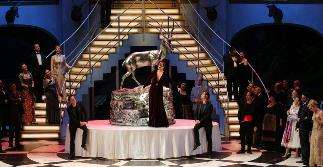|
Back
A nouveau riche affair Milano
Teatro alla Scala
01/19/2018 - & January 21, 23, 28, 31, February 2, 4, 11, 2018
Johann Strauss, jr.: Die Fledermaus
Peter Sonn (Gabriel von Eisenstein), Eva Mei (Rosalinde), Markus Werba (Dr. Falke), Michael Kraus (Frank), Daniela Fally*/Maria Nazarova (Adele), Elena Maximova (Orlovskaya), Giorgio Berrugi (Alfred), Kresimir Spicer (Dr. Blind), Paolo Rossi (Frosch), Ann Doris Capitelli (Ida)
Coro del Teatro alla Scala, Bruno Casoni (Chorus Master), Orchestra del Teatro alla Scala, Cornelius Meister (Conductor)
Cornelius Obonya & Carolin Pienkos (Stage Director & Sets), Heike Scheele (Costumes), Friedrich Rom (Lighting), Heinz Spoerli (Choreography)

(© Marco Brescia & Rudy Amisano)
Astonishingly, this is the first performance ever of Die Fledermaus at La Scala. Being an operetta may be the reason it wasn’t previously admitted to the high temple of opera. This, despite that abundant verismo mediocrities have often been performed (and several even premiered) at La Scala. Instead of cosmopolitan late 1800s Habsburg Vienna, this production is set at the present time, in the posh alpine resort of Kitzbühel, where the international jet set and a more louche nouveau riche clientele mingle. Eisenstein’s home is impressively modern with a Giacometti statue, a transparent Philippe Starck seat, a Poltrona Frau sofa and several paintings including one hung upside down to reveal the philistine nature of the obviously well to do couple. Eisenstein is charged with fiscal evasion rather than with slapping a policeman, as in the original setting. Adele brings Eisenstein’s last meal before his incarceration in a delivery box rather than served by the next door restaurant à la gemütlich fin de siècle Vienna. The maid Adele finds out about Orlovsky’s ball through a text message from her sister Ida. Loverboy Alfred, once comfortably settled in, puts on Eisenstein’s kimono rather than his robe de chambre. Alfred eschews Eisenstein by imprudently going outdoors in the frigid snow and hides up a Christmas tree, where he balances right and left when the music evokes a waltz. The brilliantly conducted overture was intelligently transformed into a ballet. The choreography exuded hedonism. In the final bars of the overture, the leading couple was catapulted into the air at the crescendo of the music, expressing the music’s exuberance. However, this acrobatic device went too far in other dances.
Peter Sonn was a solid Eisenstein, vocally effective and dramatically convincing as a rather uncouth upstart. Most impressive was Markus Werba as his vengeful friend and prankster, Dr. Falke. The voice is beautiful and his clear idiomatic diction in this light opera is worthy of a Lieder recital. The weakest link was Eva Mei’s Rosalinde. Her skillful acting and graceful movement on stage helped reduce the gravity of a lyric voice having sustained much damage. Yet as a veteran professional, she was able to sing a more than acceptable Czardas, despite ill-supported high notes and a persistent wobble. Though she has good German diction, her faux accent as a make-believe Hungarian Countess was unconvincing.
Daniela Fally’s Adele revealed a gifted coloratura with a strong stage presence, overshadowing Rosalinde, a rare event in this work. Her “Mein Herr Marquis,” known as the laughing song, vocally effervescent, was paradoxically somewhat lacking in natural humour. Nonetheless, her Act III Audition aria, “ Spiel’ ich die Unschuld vom Lande,” was convincingly amusing. Giorgio Berrugi, as Alfred, has an appropriately sweet and lyrical voice. The musical quotations by the tenor from Un ballo in maschera were a clever reference to the marital infidelity preoccupying him.
The centrepiece at Orlovsky’s ball was a silver statue of a stag, the emblem of the town of Kitzbühel. A mix of elegant hosts, nouveaux riches and other impostors as well as a mafioso bodyguard were the cast of the updated guest list. The novel idea of transforming Prince Orlovsky into Orlovskaya was inspired. Previous attempts I’ve witnessed at making trousers roles into female ones have failed miserably, demonstrating a prudish stage director’s unease with operatic cross dressing. However, in this context, a female Russian oligarch was a welcome innovation, and a smooth transformation. Mezzo Elena Maximova as Orlovskaya had an imposing voice. Her instrument being higher than usual was appropriate, given that the character is female in this updated staging. Though one can accept and even welcome the changed characters, much falls flat in Cornelius Obonya and Carolin Pienkos’s staging. Perhaps the charm of fin de siècle Vienna cannot be updated into a charmless present. In this staging, Rosalinde seems to be already having an affair with her husband’s friend Dr. Falke. This renders the tenor Alfred’s advances rather irrelevant and lacking tension, as in the original setting. As is often the case with operas with much spoken dialogue, the vernacular is used. This production opts for a mixing of German and Italian, effective for the few who speak both languages, but tiresome for the overwhelming majority who do not.
The third act is the most challenging in Die Fledermaus, as the music is mostly a repeat of that which played in the previous act, and as it involves a heavy dose of spoken comedy. The comedy does not always work, even when the setting and the language are the original. Comedian Paolo Rossi’s references to the historical presence of Austrians in Milan (La Scala was built under Habsburg rule) and his foray into Italian political satire were unsuccessful. Visually appealing yet theatrically flawed, Johann Strauss’s timeless masterpieces deserved more for their La Scala debut.
Ossama el Naggar
|